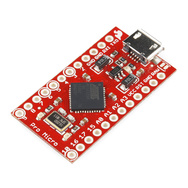Recently, we announced the addition of a new product to our line of development boards - the SparkFun ProMicro. The ProMicro uses the ATMega32U4 so you don't need an external programmer (like the FTDI Basic) to program the microcontroller. This tiny board has all the Arduino tricks you're familiar with - 4 channels of 10-bit ADC, 5 PWM pins, 12 DIOs as well as hardware serial connections Rx and Tx. It's also quite small and perfect for a space or weight restrictive project. To help you use this new cool board, Jim (AKA Jimbo) from Engineering came up with this tutoral: A ProMicro Installation and Arduino Briefing.
In this tutorial, you'll learn how to install drivers on the ProMicro and use it in the world of Arduino. This tutorial hopes to aid in avoiding common pitfalls users might run into and get your ProMicro up and running as swiftly as possible. Check it out! We hope you find this tutorial helpful and, as always, please let us know if you have any additional questions. Cheers!







Guys! You need to do more stuff with PICAXE! They're way better than Arduino and they even have a base that fits the shields and stripboard! ( http://www.picaxe.com/docs/axe401.pdf ) They should be getting a lilypad version out as well! Come on!
They both have merit, so does the netduino/fez stuff. You shouldn't keep your opinions to yourself, but find a better place for it. Starting a arduino vs PICAXE flame war in a product post is kinda silly. Honestly i could care less is the PICAXE Has a flux capacitor and twice the storage of mary poppins bag of holding. This page is for the ProMicro. I hate irrelevent posts. you got my hopes up when i saw comments, thinking i could get some peoples perspective. now every one slap their hands, bad sparkfun customers.
.
Nice to see PICAXE conforming to the standard. Still, in my opinion, they'll always be lagging behind Arduino because of driver development. It's just easier to build Arduino-friendly libraries in C (since that's the language in which most drivers are written on other platforms). There's also a pool of users utilizing Processing language for data visualization. Since Arduino programming environment is directly compatible with Processing, it makes coding a lot easier.
If PICAXE was "better", Atmega would be conforming to their form factor instead of other way around.
... also, look at the ICSP header on PICAXE (page 17 of the PDF). That just looks sad, doesn't it?! They couldn't find a better place to stick it. Really?!
the ICSP header is if you want to program it as a PIC. the Picaxe only needs two resistors and a basic serial connection to program. There are many great and varied boards about that are build for various applications (not just the restrictive adruino footprint) and it is easier to breadboard. In terms of language and uses each have their own benifits, as a teacher, picaxe basics is alot easier to teach and for the students to understand without all these hidden libraries but then again it doesn't have some of the functions that arduino has. I prefer PICAXE and that is my decision, what would you prefer and amstrad or commodore 64?
You now have me curious as to why they are "better".
to some better = cheaper... but seriously, they would probably be bigger competition if their code was open source...
I'd guess that "better" means one of two things: 1: Better for his particular application
or
2: Better, because he is more familiar with it.
I've got an assortment of microcontrollers, including original PIC chips, Basic Stamp 1 and 2, PicAxe, Arduino, Propeller, MBED, Teensy+, and I choose the platform that I feel will be better for each specific application I'm working on. Saying one is BETTER than the other in a generic sense is meaningless.
Speaking of all-in-one 32U4 boards, you guys should stock these:
http://www.freetronics.com/pages/leostick-quickstart-guide
They were in the schwag bags at linux.conf.au less than a month ago, and are really excellent.
I need one! nice find :)
Guys! Are we really talking about this???
PIC < AVR < ARM < i38 < AMD64
but AMD < Intel
No arguments :-)
But Intel < IBM Power7 :D
Again, you need to break out the 5th and 6th ADC pins.
Dear Guys, I'm using PROMICRO 5V-16MHz to emulate both an usb mouse and keyboard..It work good but when I send some character keyboard or mouse movement, the promicro board always turn on TXLED. This is a problem for me because I need to use this pin as a digital output to drive a relays. What could I do to separate the behaviour of TXLED from the keyboard and mouse functions?? Please I need help..best regards..Stefano
dose it work with (Bluetooth USB Module Minisku: WRL-09434) ?
nice to see a new variation of Arduino - but wondering if anyone could point out any strengths of this over the Teensy?
the Teensy appears to be cheaper ($16), more flexible, and a more mature project (and though not an exact Arduino-clone, it does seem to be mainly compatible).
is the ProMicro currently just a product for early adopters that want the newest new? or are there some neat features i'm missing?
Teensy lead the way 'till now, but unfortunately Arduino has now caught up.
Teensy is now a bit of a dead-end, as the Arduino IDE grows to take advantage of embedded USB, the need for 3rd party extensions like Teensy will dwindle.
There are already lots of Leonardo-compatible breakouts out there that will offer Arduino-compatibility in a myriad of form-factors.
Why would you say UNFORTUNATELY Arduino has caught up? Is it not better to have more choices? It's not like you're forced to use Arduino if you like the Teensy.. having competition and progress in different product lines helps all of us.
Unfortunate for PJRC! ;) They obviously have put a lot of work into Teensy, only to see it duplicated by an open-source project! There's no question it will have a dramatic effect on their sales in the long run.
The being said, the Leonardo platform and the myriad of variants that are/will be available soon will be awesome! The standardized codebase will help developers dramatically.
Not to get too feisty about it, but quite a while ago (couple years) I was looking for a USB-based Arduino and wound up getting in quite an argument with the Teensy's creator because he was leveraging the open-source Arduino environment to sell a proprietary product. I practically begged him to open-source the bootloader and Teensy in general and help it be the "next" Arduino, but his response was "Teensy has a business model which has been carefully considered... factored into the business model are potential lost sales opportunities for 'zealots' who will only buy a completely open platform."
So, no trouble; my choice to wait for a "completely open platform," and now that it's here I have very little pity. I admire the Teensy as a technical achievement, but it was PJRC's choice to keep it closed.
Yes I would like to see some comments on this from people who have used both. The Teensy has more variations and more IO pins available. So when to use which?